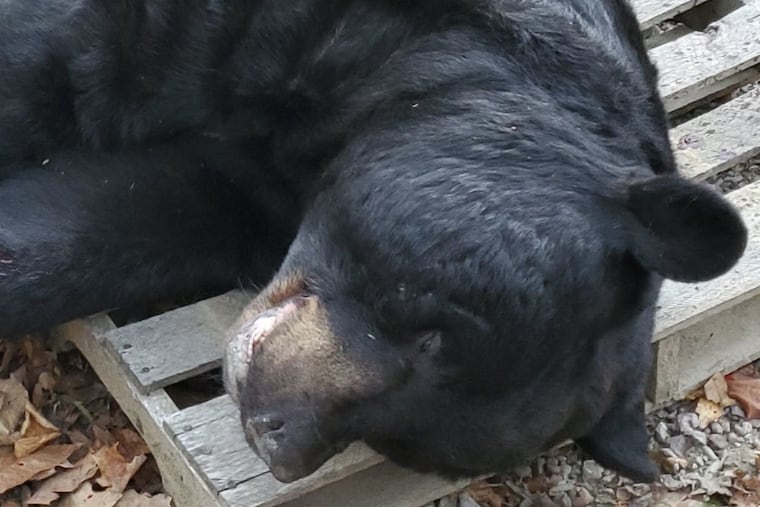At 700 pounds, black bear killed in New Jersey sets world record, says national hunting group
The bear’s size didn’t surprise at least one hunting advocate who said the high weight is the result of state restrictions on hunting that allow bears to multiply and get dangerously big.

A 700-pound black bear killed by bow on private land in Morris County, N.J., last year has set a world record for North American black bear, besting a mark set in 1993, according to the Pope and Young Club, a national bowhunting organization.
The bear’s size didn’t surprise at least one hunting advocate, who said the high weight was the result of state restrictions on hunting that allow bears to multiply and get dangerously big.
To determine if the bear was a record, the Pope and Young Club hosted a special panel for judging in Harrisburg on Feb. 8 during the Great American Outdoors Show. Pope and Young, based in Minnesota, says it is recognized as the official repository for records on bow-taken North American big-game animals. It maintains a scoring system and sets standards.
The organization said New Jersey resident Jeff Melillo bagged the bear.
“It has been an inspiring journey, to say the least,” Melillo said in a Pope and Young release. “New Jersey, my home state, has its first-ever world record animal!”
The bear was shot Oct. 14. It surpassed the previous world-record bear, shot by Robert J. Shuttleworth Jr. in Mendocino County, Calif., on Sept. 4, 1993, according to Pope and Young.
Melillo told Pope and Young that he had read an article in Outdoor Life stating that a world-record black bear would likely come someday from New Jersey.
“They were spot on, and I never doubted it for one second. I’m very grateful that I get to be a part of all this. Pursuing bears with bow and arrow is a passion of mine,” he said.
“Dedication from our biologists, technicians, and conservation officers make this all possible,” Melillo added.
Rick Mowery, a spokesperson for Pope and Young, said it is the first record archery kill of an animal in New Jersey.
Black bears are a different species from brown bears, which are also known as grizzlies.
Mowery said the size of the bear was a testament to good wildlife management by the New Jersey Division of Fish and Wildlife. But he added that recent hunting bans, such as a partial ban in New Jersey, are unhealthy for residents and bear populations, and are counter to wildlife conservation practices.
The bear, preserved through taxidermy, will be displayed at the Pope and Young Annual Convention in Virginia in March.
Eli Randall, records director for the Pope and Young Club, said the bear’s skull measured more than 23 inches.
Cody McLaughlin, vice president of the New Jersey Outdoor Alliance, a hunting and conservation advocacy group, said he congratulates Melillo and also praises state biologists for bear management.
However, he said the bear’s size is an indicator that a partial ban on bear hunting in New Jersey is allowing the animal populations to grow unchecked, causing increased potential for human contact.
New Jersey’s black bear hunt has become controversial in the last few years since Gov. Phil Murphy pledged to end it. Murphy, who found it hard to ban the hunt, prohibited it on state lands in 2018. Hunters must get permission from private landowners.
McLaughlin said the bear population is growing, and the animals are bigger, because the hunts are so limited.
“It’s important to note that it’s not an accident that the new record bear came out of New Jersey,” McLaughlin said. “And that’s because our bear population has never been thicker, especially when you take away 40% of the land people can hunt on. There’s nothing stopping these bears from growing to enormous sizes. This needs to be a wake-up call.”
Environmental groups are one of the biggest forces behind banning hunting and also find fault with Murphy’s decision to institute a ban only on public land. The New Jersey Sierra Club is still pushing for a ban.
“There have been many commitments that Murphy made during his campaign, like ending the N.J. bear hunt ... but there hasn’t been much progress," the Sierra Club said in a recent statement.
This story has been updated to reflect that black bears and brown bears are of different species.